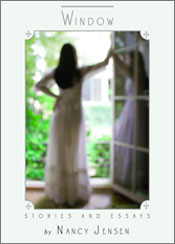Nancy Jensen
Stories:
The Ones I Married
Ever since I can remember, I have thought of myself as divorced. It started with my mother—trim, bright-eyed, thirtyish—with a sense of self-assurance so powerful that, for much of my childhood, I believed she had created me by herself out of sheer force of will. She made it a point to introduce the word “divorce” to me right alongside “mother,” “bye-bye,” “eyes,” and “chocolate.”
Holidays highlighted Mother’s happy singleness, as she laughed and smiled and joked in spite of the small knots of guests who would invariably slink into a corner to shake their heads and whisper, “Poor Bella.” It irritated me that anyone could imagine there was any reason to pity my mother, and so at one birthday party, perhaps my fifth or sixth, I shocked my grandparents out of their corner by asking cheerily, “How long have we been divorced now, Mother?”
I don’t know what they expected her to tell me, but they told her in hissing whispers that they did not approve of my saying such a word. Mother shushed me, but I knew what she was up to. We saw my grandparents so infrequently, sometimes less than once a year, that Mother could afford to humor them for a day or two at a time and then go on raising me in the way that suited her.
Actually, I was proud to have such knowledge, something in my background that smacked of scandal. I was the only child in Mrs. Riddle’s kindergarten who even knew what divorce was, and so, in a way, I was a celebrity, and I stayed one well into junior high, when a few other kids’ parents started divorcing. But I was still solidly lodged in my differentness in second grade when I started getting divorced myself, once or twice a week, from Sammy Quinn.
Ceiling by Chagall
In the Metro station at Notre Dame de Lorette, Kate takes off her gloves and waits for Michael to come back with the tickets. There is a flutist just beyond the turnstile with his case opened for change and a hand-lettered sign that says 2 ou 3 francs s’il vous plait. When they came in, he was playing Mozart, but now he is piping a bright “It Don’t Mean a Thing if It Ain’t Got That Swing.”
She hears Michael say “Deux billets” and sees him signal the way the French do, with the thumb and forefinger. He has told her he learned it when he was stationed here with the Air Force thirty years ago. Before she was born.
Essays:
Blue Belt
I was stunned to discover how much I liked to punch and kick. Five weeks into the karate class I’d joined exactly two months after my fortieth birthday, Grady, the assistant instructor, secured his arms through the elastic bands on the back of a body strike shield and held it up as a target for me to practice roundhouse kicks.
I struggled most with the turn, which required me to lift and tuck my striking leg—chambering the kick—then to twirl quickly around on the ball of my balancing foot and snap the kick out, attacking with the bony top third of the other foot. The timing eluded me, beginning the turn, whipping my head around to sight, working out just when to lift, chamber, and deploy the leg—every segment of the movement to be combined and executed in an instant.
Sensei, my instructor, a sixth degree black belt, could fire his roundhouse so quickly—some minute fraction of a second—that it was virtually invisible. I’d been practicing for two weeks, imagining a target in midair, and very slowly I was learning to lift my heel to make the spin, but unlike the front and back kicks that had come fairly easily, I felt much too fat and clumsy to master a roundhouse. I wondered if this kick might be the proving ground, determining which students could make it and which couldn’t.
Notes of an Expatriate Daughter: Shylock in Kuala Lumpur
Even as the thought occurred to me, I couldn’t believe it. It was the heat, surely. And the way the rivers of perspiration gushed from beneath the saturated hair at my temples and pooled in my ears, leaving outer sounds muffled, intensifying the inner ring. Somehow confused with my own thoughts was the rehearsed mocking of someone else’s.
Maybe because the top letter of the stack dampening in my hand was addressed to my grandmother. It was something she might have muttered when the slim-shouldered dark man, whose greasy black waves smelled of chili and dried fish, took advantage of the few inches I had left between my steaming body and that of the sari-clad woman in front of me to slide in and claim my turn.
Over his shoulder, I could see how his belt buckle had nipped up a bit of the mango-gold georgette and, looking down, how the friction of his back against my breasts had nearly undone a center button of my blouse. He was too close now for me to reach up to secure it in the buttonhole.
That’s when I thought it: filthy Malay.












No comments so far ↓
Nobody has commented yet. Be the first!
Comment